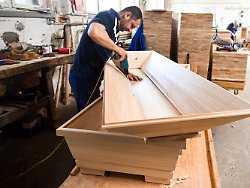Consequences of the Ukraine war
German manufacturers increase coffin prices
5/5/2022, 6:24 p.m
Higher costs for energy and raw materials are also noticeable among German coffin manufacturers. More than half of them want to raise prices by 10 to 20 percent. The reason for the surcharges is said to be the war in Ukraine.
Anyone who has to take care of the burial of a relative could pay significantly more to the undertaker in the future than before. Because Germany’s coffin manufacturers want to raise their prices sharply. According to an industry survey by the Bundesverband Bestattungsbedarf, more than every second manufacturer intends to raise prices by 10 to 20 percent in the current year. Some companies want to charge even more.
It’s about the prices that the manufacturers charge the undertakers. The undertakers will probably pass on the increase in whole or at least in part to their customers. Association head Jürgen Stahl justified the surcharges primarily with the consequences of the Ukraine war. Energy and wood have become more expensive, and there are also bottlenecks in the supply of primary products. Manufacturers also use goods from Ukraine, such as metal clips and yarn for interior trim.
The impending price increase is remarkable in that the domestic industry has already increased prices in the low double-digit percentage range in the past two years, according to the association – mainly because of higher wood prices. In Germany, a coffin made in Germany that is cremated costs around 250 to 400 euros, according to the association. For coffins that go underground, the price range is often 300 to 600 euros – although there are also significantly more expensive coffins that cost several thousand euros.
The coffin-making industry is small; the association has 19 member companies from this market segment. The industry includes, for example, Lignotec from Berlin and Andres & Massmann from Blankenrath in Rhineland-Palatinate. Most companies have fewer than 20 employees. Basically, the chairman of the association, who is also the head of Stahl Sargfertigung GmbH from Kleinheubach in Franconia, sees the prospects for the industry as positive: “Coffins are always needed, people always die.”
Cremation trend burdens domestic industry
However, the trend towards cremation has been causing problems for domestic manufacturers for a long time, because cheap imports from Eastern Europe are often used for this. Ten to 15 years ago there were three times as many coffin manufacturers in Germany as there are now, says the head of the association, Stahl. “The number of Eastern European imports has increased significantly and the coffin level has changed.” For example, many coffins used in Germany now come from Poland.
Of the approximately one million coffins that are used in Germany every year, an estimated 60 percent are from abroad. That leaves 40 percent “Made in Germany”. These wooden boxes are divided equally between coffins, which are completely manufactured in Germany, and specimens, which come from abroad as unprocessed wooden containers and are “refined” in this country – they are decorated with carvings and get a fabric cover as interior equipment.
And what do the buyers, i.e. the undertakers, say about the price increases? Sometimes they “swallow it,” but sometimes you also notice “that the cremation coffins are in even greater demand,” says the head of Cologne’s Peter Braun coffin factory, Erich Allescher. He assumes that the proportion of cremation will continue to rise.
